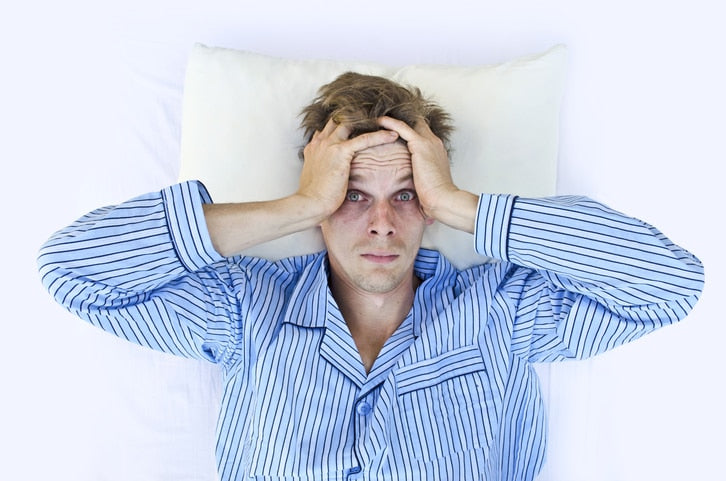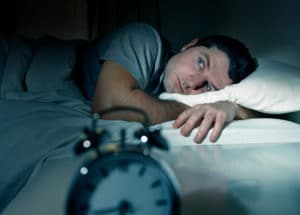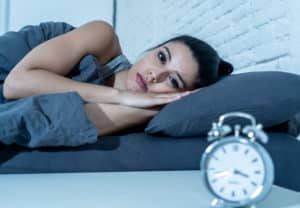
Best Mattress for Insomnia
Sleeping troubles are common. Millions of Americans experience tossing and turning, waking frequently, and trouble falling asleep each night. These issues can begin to affect everyday life, influencing work performance, mood, and energy.
A disrupted or nonexistent sleep routine can become a medically defined problem, meaning it can eventually develop into chronic sleep disorders like insomnia. This can hinder anyone's overall health and happiness, as sleep is essential to survive.Insomnia Definition
 What is Insomnia? Insomnia is a sleep disorder that makes it difficult to fall asleep, stay asleep, or get enough deep sleep during the sleep cycle. Insomnia can last a few days to many months. You may have a sleep disorder like insomnia if, despite maintaining healthy habits and bedtime routines, you still have trouble sleeping and feel tired during the day. Insomnia can derail your ability to reach deeper levels of sleep, like Rapid Eye Movement (R.E.M.). Insomnia can even affect the ability to feel tired at all or fall asleep to begin with.
What is Insomnia? Insomnia is a sleep disorder that makes it difficult to fall asleep, stay asleep, or get enough deep sleep during the sleep cycle. Insomnia can last a few days to many months. You may have a sleep disorder like insomnia if, despite maintaining healthy habits and bedtime routines, you still have trouble sleeping and feel tired during the day. Insomnia can derail your ability to reach deeper levels of sleep, like Rapid Eye Movement (R.E.M.). Insomnia can even affect the ability to feel tired at all or fall asleep to begin with.
Deep sleep, including R.E.M., is one of the body's only ways to rejuvenate the mind, store memories and information, and repair muscles and joints through proper circulation and hormone distribution.When sleep patterns are halted or disrupted, a sleep deficit, or "sleep debt," grows. This leads to issues like insomnia.
Acute Insomnia
Short-term insomnia usually lasts for only a few days or weeks but can often result from stress-related instances or a minor or moderate change in routine or schedule. It can also be caused by changes in surroundings, like lighting or temperature. Whether short- or long-term, when not addressed in a reasonable amount of time, insomnia can lead to other health issues.Chronic Insomnia
To properly diagnose chronic insomnia, a medical professional can help you distinguish whether you may have acute version insomnia or long-term chronic insomnia disorder.Diagnosing Insomnia
Insomnia can be self-diagnosed or pinpointed by a medical professional. These are the common symptoms to look for:- Trouble falling asleep or staying asleep
- Waking frequently/waking up early without being able to fall back asleep
- Feeling tired during the day/not feeling rested
- "Brain fog" or difficulty focusing
- Delayed reaction time (being prone to accidents)
- Lack of memory/ability to store information
- Rate of occurrence: If lack of sleep, fatigue, and other symptoms occur at least three or four times per week.
- Time span: When issues extend consecutively for periods of three months or more.
- Circumstantial: If you experience significant “life pressure” or anxiety causes an inability to fall asleep or stay asleep. If you keep a comfortable sleep environment with no harsh circumstances that justify losing sleep, a medical professional may be more likely to diagnose you with chronic insomnia disorder.
- Undefined: When all factors, including substances or medications (medicinal or non-medicinal), are not affecting your ability to sleep, the cause of sleeping disorders like insomnia is undetermined.
Insomnia Causes
Napping too often during the daytime hours can be a major hindrance to a healthy sleep routine. Especially later in the day, naps can prevent the ability to feel tired in the evening when it is time to sleep. This leaves your body less time for a rejuvenating slumber cycle when you need it most and causes an increased sleep debt. This perpetuates the disruption of the sleep cycle. A nap isn't always a bad thing, but it must be taken during the proper time of the day for the right amount of time. Regular napping to catch up on sleep can become a bad habit that will only intensify the cycle of feeling tired or worn out from insufficient R.E.M. sleep.
A nap isn't always a bad thing, but it must be taken during the proper time of the day for the right amount of time. Regular napping to catch up on sleep can become a bad habit that will only intensify the cycle of feeling tired or worn out from insufficient R.E.M. sleep.
Though not always the cause of sleep issues, insomnia is often associated with anxiety and depression.There are other common causes of sleep disorders like insomnia:
- Post Traumatic Stress Disorder (P.T.S.D.)
- Obstructive Sleep Apnea (O.S.A.)
- Restless Leg Syndrome (R.L.S.)
- Chronic pain
- Diabetes
- Heart disease
- Gastroesophageal Reflux Disease (G.E.R.D.)
- Overactive thyroid
- Parkinson's
- Alzheimer's
Ideal Sleep Environment
Several considerable aspects can seriously affect your ability to stay asleep and fall asleep in a reasonable amount of time. Studies have concluded that it should take approximately fifteen minutes to fall asleep. If you fall asleep "as soon as your head hits the pillow," then you are likely sleep deprived. Common factors that will improve your sleep environment:- Mattress comfort (make sure you have a supportive, comfortable, good-quality mattress that will help support pressure points on your body)
- Temperature (not too hot or too cold for your preference)
- Darkness (blackout curtains, blinds)
- Eliminate distracting technology (phone, laptop, TV, anything with blue light)
- Skip caffeine and alcohol close to bedtime.
Optimal Sleeping Routine
 There are a number of factors involved in getting a good night’s sleep, and some may find it easier to achieve a successful night’s sleep than others. Those with insomnia or sleep disorders should seriously consider upping the ante by shaping the ideal sleep environment and keeping a healthy bedtime routine. Here are a few actions you can take to help your body wind down and manage stress before going to sleep:
There are a number of factors involved in getting a good night’s sleep, and some may find it easier to achieve a successful night’s sleep than others. Those with insomnia or sleep disorders should seriously consider upping the ante by shaping the ideal sleep environment and keeping a healthy bedtime routine. Here are a few actions you can take to help your body wind down and manage stress before going to sleep:
- Meditation
- Aromatherapy
- Hot bath/soak
- Massage (in-home massage chairs are a great relaxation tool)
- A mattress that is agreeable to your body and sleep style (mattress comfort is crucial to sleep health!)
Insomnia Risks
Some people are more susceptible to insomnia than others. You have a considerably higher risk of developing insomnia if:- You're female: Hormones and menopause can cause sleep disruptions often linked to night sweats and hot flashes.
- You're pregnant: Insomnia often occurs during pregnancy.
- You’re over 60: Health and sleep patterns change and increase your risk as you age.
- You have an irregular schedule: Things like jet lag or a change in work shifts.
- You have a mental health disability
- You have a condition that affects your physical well-being (chronic pain)
Insomnia Treatments
There are a wide variety of sleep disorder treatments available today. Some treatments practice more natural and holistic options than others. The proper remedy for you can also depend on the cause of your sleep deprivation.Lifestyle Changes
Modifying your daily habits can drastically reduce insomnia symptoms. Practice healthy habits, like exercising at least 30 minutes daily or eating beneficial foods rich in melatonin. For an improved diet that assists with a peaceful slumber, try increasing your intake or introducing these foods:- Tart cherries
- Goji berries
- Eggs
- Milk
- Fish
- Nuts (pistachio, almonds)
A pro tip: Don't overeat before trying to sleep. Eating right before bed can provoke acid reflux which can cause unwanted awakenings.When functioning correctly, your body has a natural circadian rhythm based on the sun's rhythms, precisely darkness and light. Melatonin should be naturally released to help you feel sleepy when the sun goes down or if it gets dark. Serotonin production during the daylight hours allows you to feel awake in the morning.
[cta id="shop"]
Medications
Sleep aids that contain compounds like melatonin, glycine (amino acid said to promote higher levels of serotonin), or C.B.D. supplements to induce sleepiness are available. Medications like Ambien, classified as a sedative-hypnotic, can be prescribed by a doctor to help you fall asleep. A word of advice from sleep specialists, though: The best and least risky way to improve your sleep quality is by enhancing what your body is capable of doing on its own. Introducing tools, like natural sleep aids, to encourage a natural improvement in your overall comfort and sleep ability is often the best way to start. Unfortunately, prescription sleep aids can be habit-forming. They often have more risks or side effects, like daytime grogginess, that may not be worth it in the long run. Before using medication to sleep, speak with your doctor about introducing these natural remedies:- Melatonin
- Valerian roots or stems
- Cannabidiol (C.B.D.)
- California poppy (sedative)
- Glycine (amino acid)
- Chamomile (antioxidant apigenin)
- 5-hydroxytryptophan (5-HTP is utilized by the body to naturally produce melatonin)
- Passionflower (contains GABA, a brain chemical that can affect sleep and overall mood)
- Magnesium (mineral that can improve sleep for those with R.L.S. and in older individuals)
- Tart cherry juice (a natural source of melatonin)
- Magnolia bark (contains honokiol that helps improve sleep; used in traditional Chinese medicine as a treatment for anxiety and depression)
Mattresses with the Potential to Help Reduce Insomnia Symptoms
Let's face it, that old mattress you've been thinking about replacing for the last few months now isn't going to cut it anymore. If you're already having trouble sleeping, an old or uncomfortable mattress can be one of the biggest hindrances to getting the good night’s sleep you need. Unlock better nights of sleep with a high-quality mattress that suits your body. A mattress should support your sleep style and fit your curves. Tossing, turning, and waking up throughout the night can be easily reduced by accomplishing even body-weight distribution from your sleep surface.The bottom line is that your mattress matters!It is a crucial factor in getting that rejuvenating sleep you desire, and it can help improve insomnia symptoms. A mattress is an investment, so don’t compromise when it comes to where you sleep, especially if you have physical ailments or sleep disorders like insomnia.
Which Mattresses Can Help Reduce Insomnia Symptoms?
 The comfort of a mattress can vary from person to person. The need for different comfort levels depends on body size, sleep position, and the number of sleepers in the bed. Some prefer a firm surface, typically back sleepers or those with larger bodies. Some need a soft surface, generally side sleepers, arthritis and fibromyalgia sufferers, and petite body frames.
A mattress is designed to evenly disperse body weight to eliminate or reduce pressure on your pressure points. A mattress that fits you appropriately will provide a floating sensation because it offers proper support and pressure relief on the hips, shoulders, and lower back.
The comfort of a mattress can vary from person to person. The need for different comfort levels depends on body size, sleep position, and the number of sleepers in the bed. Some prefer a firm surface, typically back sleepers or those with larger bodies. Some need a soft surface, generally side sleepers, arthritis and fibromyalgia sufferers, and petite body frames.
A mattress is designed to evenly disperse body weight to eliminate or reduce pressure on your pressure points. A mattress that fits you appropriately will provide a floating sensation because it offers proper support and pressure relief on the hips, shoulders, and lower back.
Traditional and Hybrid Mattresses
Traditional and hybrid mattresses use independent support coils that serve as a means for spinal alignment, support responsiveness, and breathability. Polyfoams, latex rubber, and visco foams add extra means for weight distribution and comfort. Layers of materials closer to the surface are "comfort layers" that create a surface feel to allow your muscles to relax while relieving pressure from your body weight. Stearns & Foster Estate Mattress Best for:- Heavier individuals
- A traditional mattress feel (little-to-no memory foam)
- Changing positions
- Breathability and temperature moderation
- Providing traditional coil support/responsiveness
- Combining the best of both-adaptive support coils with weight-balancing materials
- Pressure-point relaxation
- Lively and buoyant mattress feel
- Traditional coil support/bounce
- Fast response when changing positions
- Sleeps just right: not too hot nor too cold
Latex and Pressure Relieving Mattresses
Some bodies will prefer a mattress without coils because there is little to no bounce element, compared to a mattress with a traditional innerspring. Mattresses without coils are best suited for sleepers who have opposite sleep schedules or for those who wake up easily when their partner moves. Temperpedic LuxeAdapt Best for:- Balancing support for pressure relief
- Cradling the spine and surrounding muscles
- Keeping you comfortable in one position all night long
- Offsetting pressure through spinal alignment
- Adapting to keep you comfortable in any and all positions
- Muscle relaxation
- Buoyant lift and support without coils
- Providing an “on the mattress” feel
- Balanced weight distribution through pressure point relief
- Providing a feeling of weightlessness
